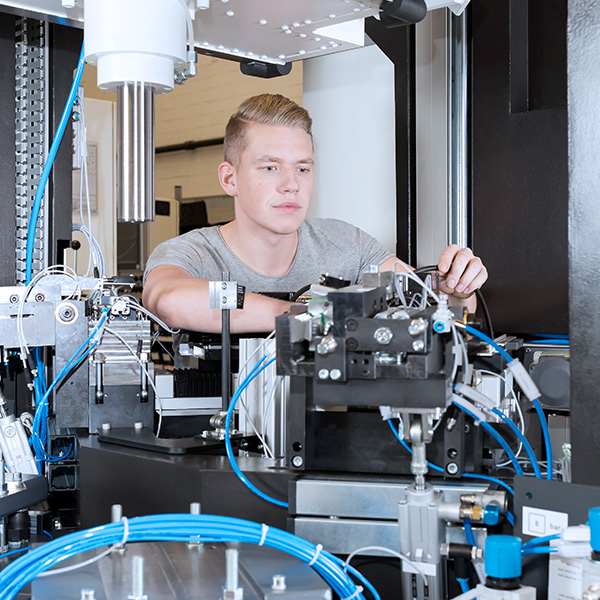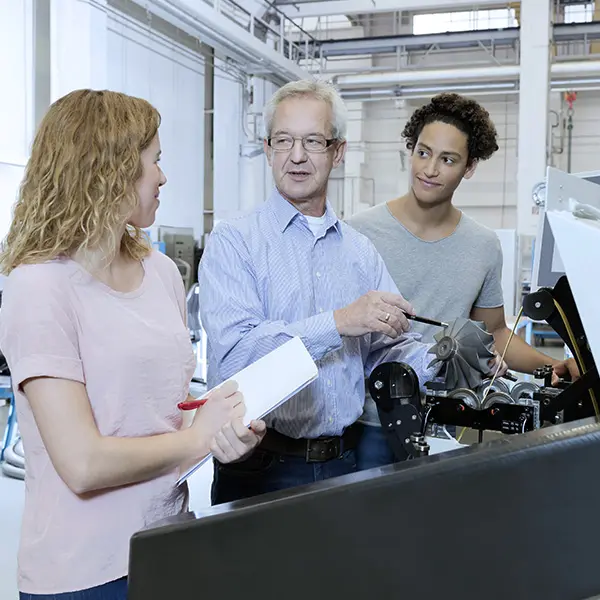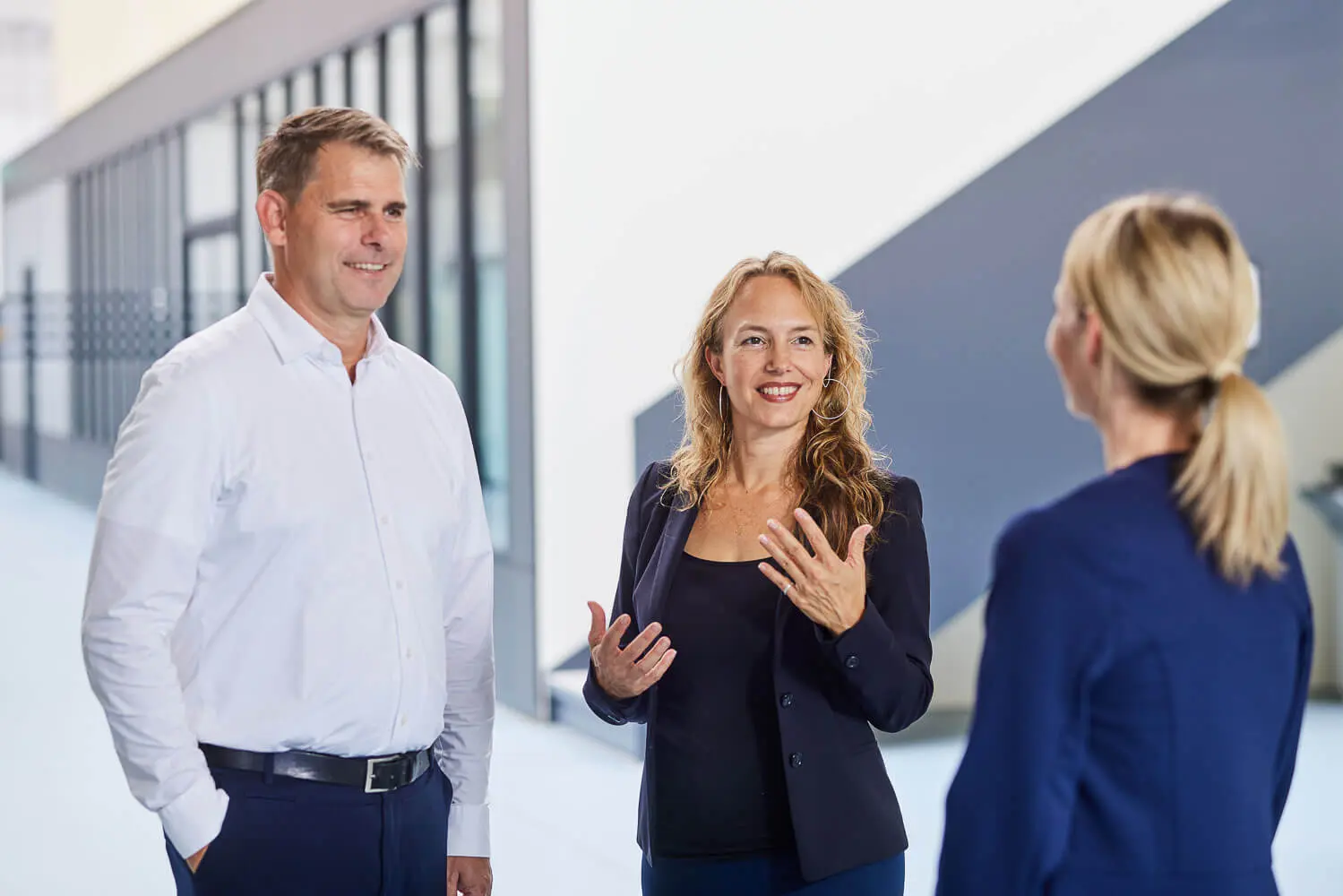Career opportunities for pupils Apprenticeship, cooperative study program or school internship at Schenck
Perfect for practical people who like the sciences: find out more about your career opportunities at Schenck, from apprenticeships to cooperative study programs. To make sure you’re well equipped for your future.

Apprenticeship in mechatronics: variety in skilled trades at Schenck
Apprenticeship as a mechatronics technician
Do you feel drawn to the skilled trades? Is variety important to you? Then you should take a look at the mechatronics apprenticeship that Schenck offers. If you’re interested in having a broad base, then this is just right for you: an exciting mixture of machine construction, electrical engineering and IT.

-
What will you be learning (content)?
-
As a mechatronics apprentice, you learn all about machines and how their components work together. We make you fit to handle state-of-the-art machine systems:
- Planning and controlling workflows
- Commissioning and operating mechatronic systems
- Setting up and testing electronic, pneumatic and hydraulic control units
- Measuring and testing electrical variables
- Assembling components and parts into machines and systems
- Carrying out maintenance and servicing of production facilities
- Programming, installing and testing modern hard- and software components
- Handing completed facilities over to the customer
-
Where will you be learning (site)?
-
The practical part of your apprenticeship takes place at Schenck in Darmstadt. As an international company, we offer opportunities to work in Germany and abroad. The apprenticeship is offered in cooperation with the Erasmus-Kittler-Schule in Darmstadt.
-
How long will be it take (duration)?
-
The apprenticeship takes 3.5 years. This can be reduced if you perform well at work and do well at college.
-
What will you be learning for (opportunities)
-
On passing your apprenticeship examinations in mechatronics, you will be a sought-after skilled worker, with many opportunities to continue your training and obtain further qualifications. Your skills will be needed in all sectors of the economy, wherever machines and systems are constructed or used. In other words, particularly at Schenck.
-
Requirements
-
- Have you already obtained a secondary school certificate (Mittlere Reife in Germany), or university entrance qualifications (Fachabitur or Allgemeine Hochschulreife in Germany). Or will you graduate from school at the end of this academic year?
- Do you have excellent German language skills, both written and spoken, since many courses are taught in German?
- Do you enjoy and get good grades in mathematics and physics?
- Do you like working in a team, are you willing to learn and have you got good communication skills?
Do you fulfil these requirements? Then we look forward to receiving your application.
By the way, the program begins each year on 1 August. Preferably, we should have received your application twelve months in advance.
Best opportunities right from the start
Cooperative study program at Schenck
A degree gives you outstanding prerequisites for your future career. And a cooperative study program also helps you take the first step. Professional experience right from the very first day, working in different parts of the company, involvement in real projects and sharing responsibility in the team: this means you do more than acquire theoretical knowledge: from the very beginning you will be collecting the kind of experience that really matters later on.
Important information
A cooperative study program takes 3 to 3.5 years, including a period spent abroad during one of the practical phases. Almost all the courses give you the Bachelor of Science degree. The exception to this rule is the course in Electrical Engineering and IT, which leads to the Bachelor of Engineering. We offer our degree courses in cooperation with the Hochschule Darmstadt.
Prior to your degree course, you will start your program with us by doing a two-month preparatory internship. This begins each year on 1 August. Your degree course then begins on 1 October. Preferably, you should submit your application 12 months in advance.

We offer these degree courses
-
Electrical engineering and IT – KoSE (Bachelor of Engineering)
-
The way electrical engineering and IT work together is very important for industrial manufacturing. Why does an industrial robot always grip the right part? How do apps control machines? Practical questions that urgently need electrical engineers.
As a graduate from this degree course, you will analyse electronic systems and develop solutions for current problems in production technology. Technical know-how is complemented by essential knowledge about automation systems.
This is what you’ll learn:
- Combined use of electrical engineering and IT
- Simulation of technical systems
- Setting up and programming microprocessors
- Automation
More information is available from Hochschule Darmstadt: degree course in electrical engineering and IT (KoSE)
-
Computer science – KoSi (Bachelor of Science)
-
Computer science plays a main role in all key technologies, from software development to safety and security consulting, from network development to user training – computer scientists are sought-after specialists!
As a graduate from this degree course, you will analyse and develop solutions for digital networks, embedded systems or automation technology. Throughout the whole course, there will be a focus on programming and software development. Depending on your speciality, you can supplement your studies with important knowledge in the fields of electrical engineering and IT, software engineering, IT security and project management.
This is what you’ll learn:
- Software development, design, testing and maintenance
- Design and quality assurance of embedded systems
- Software development for embedded systems
- Analysing contexts and developing solutions for current problems
More information is available from: Hochschule Darmstadt: degree course in computer science
-
Mechatronics engineering (Bachelor of Science)
-
Learn how machines work. Construct systems that interact. As a mechatronics engineer, you have broad based knowledge of many technical disciplines – you make things work!
Graduates from this degree course develop and design machines and systems that consist of mechanical, electronic and IT components.
This is what you’ll learn:
- Devising and designing balancing machines and equipment
- Developing new products
- Commissioning (introducing our machines to the customer, including training the maintenance and operating staff)
- Quality management
- Technical sales
More information is available from: Hochschule Darmstadt: degree course in mechatronics engineering
-
Industrial engineering (Bachelor of Science)
-
Graduates of the Industrial engineering course combine technical expertise with business-oriented thinking. They acquire in-depth knowledge in both disciplines, enabling them to manage complex projects and take on responsibility early in their careers. During the course, you can choose between two specializations: electrical engineering or mechanical engineering.
This is what you’ll learn:
- Holistic project coordination with regard to technological and economic aspects
- Marketing and sales of products and systems
- Controlling and consulting
- Procurement and vendor management
- Quality management
More information is available from: Hochschule Darmstadt: degree course in industrial engineering
More information covering all aspects of your application
-
Requirements
-
- Have you already obtained university entrance qualifications (Fachabitur or Allgemeine Hochschulreife in Germany). Or will you be doing so at the end of this academic year?
- All courses are taught in German. A good command of the language is recommended.
- Do you enjoy and get good grades in mathematics and physics?
- Do you like working in a team, are you willing to learn and have you got good communication skills?
Then a cooperative study program at Schenck is just the right thing for you!
-
Tips for your application
-
Please use our job portal.
Your application should include:
- Cover letter
- CV (preferably with your picture)
- Last two school reports
- Certificates about any extracurricular activities (if available)
- Letters of reference from any internships (if available)
Please note that your application documents are all we have at first in order to gain an initial impressions of who you are. Your application should therefore by orderly, well organised, complete and informative. If in addition you let us know what you are interested in, which hobbies you have, or when you will be leaving school, this will also give us a better impression.
-
What happens after your application?
-
- Candidates are chosen according to the applications. If you are chosen, you will be invited to an aptitude test held in the training workshop in Langen. First and foremost, this will examine your mathematical skills.
- Done well in the aptitude test? Then a personal interview will let us get to know you better. This gives you an opportunity to ask any questions and to convince us of your talents!
- If we decide that you are the right candidate, you will receive all your contract documents. Then we will welcome you to Schenck RoTec!
Come and take a look
School internship at Schenck
Are you looking for a work experience placement or school internship? Then we’re just the right place for you! You can apply all year round. By the way, placements always get taken up quickly when all schools specify internships at the same time. Please therefore submit your application in good time.
Patrizia Wierzoch from our HR team will gladly answer your questions in advance.
What you can look forward to
Benefits for apprentices at Schenck
Intensive mentoring from experienced training supervisors
Remuneration in line with collective bargaining agreements
30 days annual leave
Free Job Ticket
Range of company sports activities
Onboarding week and events for apprentices
Lunch allowance
35-hour week
Annual apprentices’ event
Kick-start your career at Schenck 9 good reasons, lots of advantages and clear values: find out why it’s worth your while to start your career at Schenck.

FAQ
Here are some rapid answers to frequently asked questions covering all aspects of your apprenticeship, your cooperative study program or your school internship at Schenck. Is your question not included? Then please contact us personally.
-
How can I apply for an apprenticeship?
-
Please only use our job portal to submit your application for the apprenticeship on offer or your planned degree course. You can find the link to our online application below the job offer.
-
For which professions does Schenck offer training?
-
We offer training in the following apprenticeships and cooperative study programs:
Apprenticeship in mechatronics
Degree course in electrical engineering and IT (KoSE)
Degree course in computer science (KoSi)
Degree course in mechatronics engineering
Degree course in industrial engineering
-
Is it possible to pursue other kinds of training during the apprenticeship?
-
Yes, we offer an extensive program of training and advanced courses, which also include language courses and product training programs.
-
How much do I get paid as an apprentice?
-
Your apprenticeship pay is based on the currently valid “Hessenmetall” collective bargaining wage agreement.
-
After I’ve finished my apprenticeship or degree, can I go on to obtain a master’s degree or technician’s qualification?
-
Yes, we support you with various funding programs.
-
What are my working hours like?
-
You will work flexitime based on a 35-hour week. The exact time when you start and finish work depends on the particular site where you are working.
-
Which school leaving certificate do I need for an apprenticeship or a cooperative study program?
-
For an apprenticeship you should have obtained at least a secondary school certificate (Realschulabschluss in Germany). To join a cooperative study program, you should have obtained university entrance qualifications (Abitur or Fachabitur in Germany).
-
How long does it take to do an apprenticeship and can I reduce the period of time?
-
An apprenticeship usually takes three to three and a half years. However, if you get good marks and perform well during the apprenticeship, the period of time may be reduced subject to approval.
-
Which university / which vocational college is involved?
-
The degree courses are offered in cooperation with Darmstadt University of Applied Sciences. The apprenticeship in mechatronics is offered in cooperation with the Erasmus-Kittler-Schule in Darmstadt.
-
What is my leave entitlement during my apprenticeship / degree course?
-
You will have an annual entitlement of 30 days leave.
-
Can I go abroad as part of a cooperative study program?
-
Yes, we set great store by international training. After all, we operate on an almost global scale. If you are generally doing well, you can therefore go abroad for one of your placements.